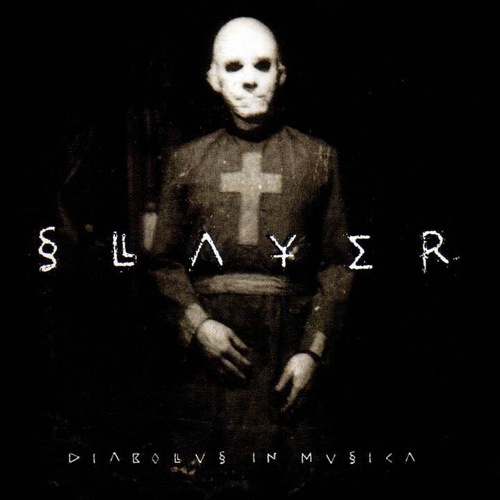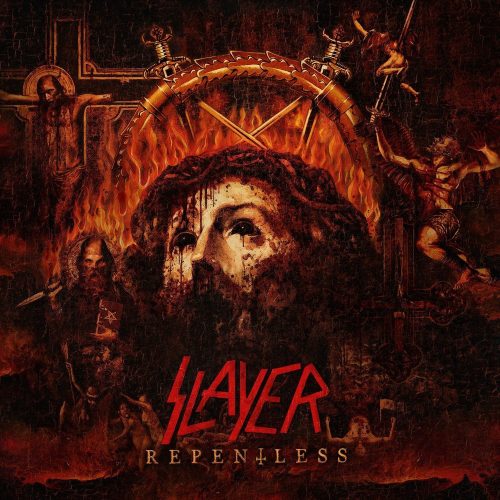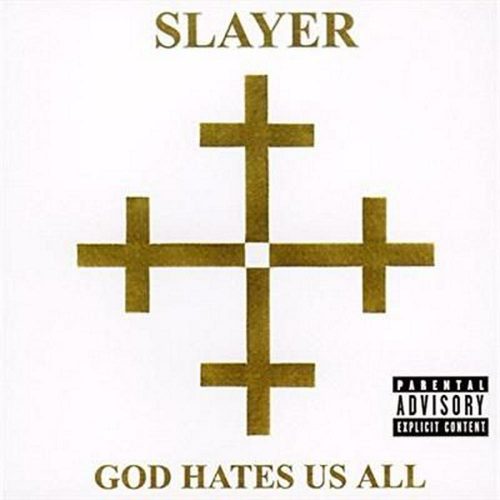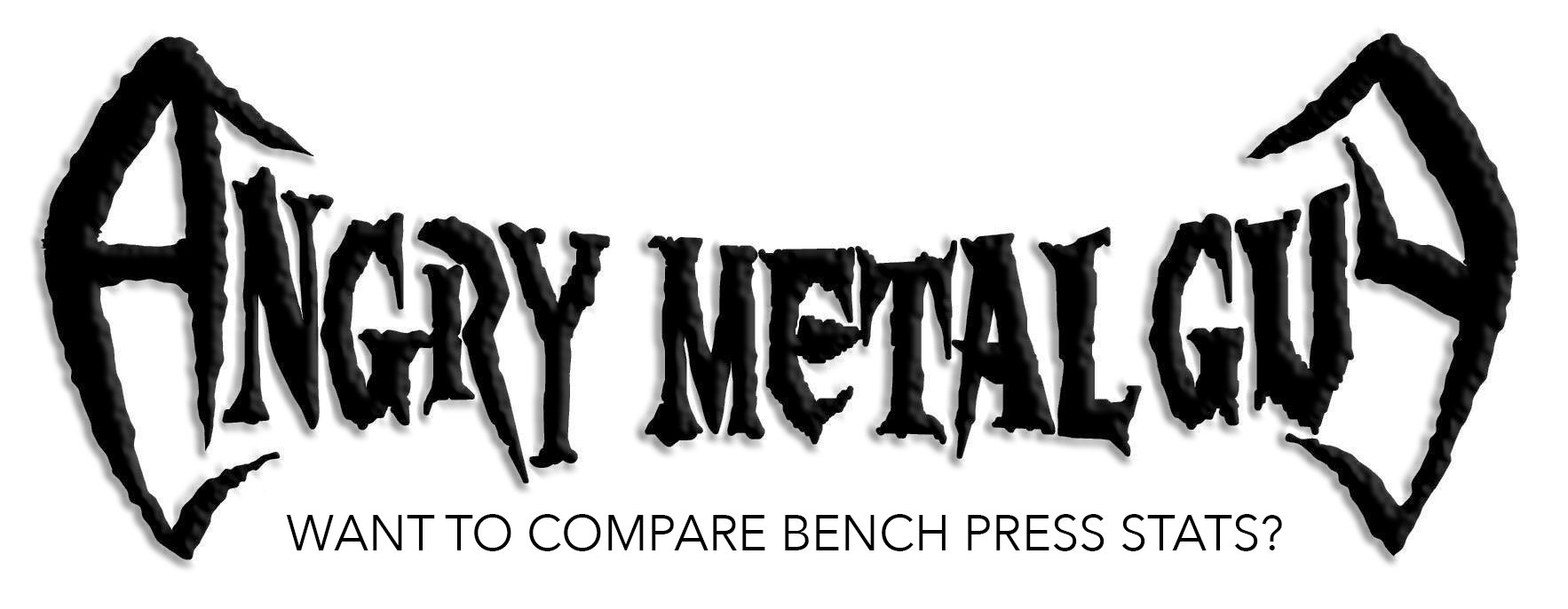 After nearly four decades of aggression, the seminal metal institution known as Slayer is closing their final chapter with a suitably massive tour. Besides attending the tour – which of course I am, twice – what better way to celebrate the thrash titans than going through their entire discography as a fan and trying to order it from Worst to First? Slayer was my true initiation into metal upon hearing them around 2004, and for more than half of my life Slayer has been my favourite band. In a bizarre yet fitting coincidence, the day before AMG Himself asked the staff about this list, a great friend and I spent the night with some Hanneman-inspired Heineken and listened to the entire Slayer studio discography in reverse order, a task that takes roughly seven and a half hours. Since a purely “objective” list would be equal parts impossible and dry, so this list serves more as an exploration of my personal history with Slayer’s discography and how their records stack up accordingly. I expect disagreement, and am aware that this list is far from unassailable. That said, it’s my sincere hope that you reading find something interesting here and perhaps dust off a copy of a Slayer record you haven’t heard in a while and enjoy it once again. Or, for the uninitiated, start your journey into the oeuvre of the greatest thrash band of all time.
After nearly four decades of aggression, the seminal metal institution known as Slayer is closing their final chapter with a suitably massive tour. Besides attending the tour – which of course I am, twice – what better way to celebrate the thrash titans than going through their entire discography as a fan and trying to order it from Worst to First? Slayer was my true initiation into metal upon hearing them around 2004, and for more than half of my life Slayer has been my favourite band. In a bizarre yet fitting coincidence, the day before AMG Himself asked the staff about this list, a great friend and I spent the night with some Hanneman-inspired Heineken and listened to the entire Slayer studio discography in reverse order, a task that takes roughly seven and a half hours. Since a purely “objective” list would be equal parts impossible and dry, so this list serves more as an exploration of my personal history with Slayer’s discography and how their records stack up accordingly. I expect disagreement, and am aware that this list is far from unassailable. That said, it’s my sincere hope that you reading find something interesting here and perhaps dust off a copy of a Slayer record you haven’t heard in a while and enjoy it once again. Or, for the uninitiated, start your journey into the oeuvre of the greatest thrash band of all time.
Let’s get the least controversial part out of the way first: the lowest-ranking records. There seems to be little popular disagreement on these, but who knows? Your favorite Slayer might be down in the rankings abyss, spending season after season there.
#12. Undisputed Attitude (1996) – Being of the opinion that there aren’t any outright bad Slayer records, ranking one as “worst” stings a little. Nonetheless, I have to put 1996’s Undisputed Attitude in this dreaded spot for one simple fact: it’s hardly even a Slayer record. Undisputed Attitude contains only three original tracks and is otherwise composed of punk covers the band happened to like. Unlike their Big Four brethren Metallica, Slayer isn’t an all-star cover band. While Garage Inc. and the now legendary 5.98 EP (included on the former) saw Metallica making a wide range of tracks their own by playing them how they would have written and performed them, Undisputed Attitude sees Slayer ripping through covers that are obviously covers. There’s a sense of respectful distance to the songs here, as if Slayer is trying to do them justice instead of take them over. Essentially, this is a tribute album instead of a true great covers album in the mold of Garage Inc.
 Nonetheless, it’s one of the best crossover records I’ve yet heard. The oft-forgotten John Dette puts on a blistering performance and keeps up with Kerry King and Jeff Hanneman, while Tom Araya’s shouts suit the material as well as they do regular Slayer tracks. Hanneman’s original punk contributions, “DDAMM” and “Can’t Stand You,” show the promise of what a whole original record of this style would sound like, leaving a lingering sense of “what if?” in the listener’s mind. It may have been better suited for a side project in the Kataklysm/Ex Deo sense, but the simple, punchy, and hooky tunes have their roughshod appeal. The lone “normal” Slayer track is “Gemini,” a slow burner that would have fit well within either Divine Intervention or Diabolus in Musica if it had either record’s production and a proper place in the sequencing. It’s good, but certainly not the best Slayer song in that vein, as it pales in comparison to a track like “213.”
Nonetheless, it’s one of the best crossover records I’ve yet heard. The oft-forgotten John Dette puts on a blistering performance and keeps up with Kerry King and Jeff Hanneman, while Tom Araya’s shouts suit the material as well as they do regular Slayer tracks. Hanneman’s original punk contributions, “DDAMM” and “Can’t Stand You,” show the promise of what a whole original record of this style would sound like, leaving a lingering sense of “what if?” in the listener’s mind. It may have been better suited for a side project in the Kataklysm/Ex Deo sense, but the simple, punchy, and hooky tunes have their roughshod appeal. The lone “normal” Slayer track is “Gemini,” a slow burner that would have fit well within either Divine Intervention or Diabolus in Musica if it had either record’s production and a proper place in the sequencing. It’s good, but certainly not the best Slayer song in that vein, as it pales in comparison to a track like “213.”
Far back in time when burning discs was cool, I’d make an endless stream of Slayer mixtapes (mixdiscs?). Material from Undisputed Attitude tended not to make those, because even back then I had the inescapable feeling that, despite being good at worst, this wasn’t a true Slayer record in essence. Overall, this is the least necessary addition to Slayer’s discography, but I still find enjoyment in it when I’m in the mood for tunes in this style.
#11. Diabolus in Musica (1998) – The dreaded nu-metal/groove metal record from the band who allegedly releases the same album ad infinitum, Diabolus in Musica is the product of a band unsure of where to go or what to do, and it shows. Cries of sellout are misguided; rather, it seems like Jeff Hanneman, who wrote the lion’s share of the record, found temporary inspiration in the prevailing trends of metal at the time and went where the current took him. The impression of Diabolus as a total wash comes from a forgetfulness of sorts, where detractors seem to remember mainly “Death’s Head,” “Love to Hate,” and “Stain of Mind.” These are, along with World Painted Blood’s “Americon,” some of the most outré songs in Slayer’s catalog. The Slayer essence is covered over with layers of blunt and aggressive groove on Diabolus’ most loathed tracks, but it forces itself to the foreground here and there. “Death’s Head” ends on a somewhat jarring return to Divine Intervention’s style, while “Love to Hate” has a brief interlude in its midsection that’s typical Hanneman melodicism. The solo section is also good, and the transition back to the verse is expertly done, showing Hanneman’s knack for songwriting despite being in unfamiliar territory. Bizarrely, “Stain of Mind” works as a Slayer song for reasons still unknown, especially due it translating well into a live environment. It’s comparable to Judas Priest making the whole crowd sing “Turbo Lover” on their recent Firepower tour in that it’s a fun, catchy snapshot of a weird time in the band’s history where they arguably strayed the furthest from their sound. The phrase “warts and all” seems to be apt here, and only a great band can force its low points on the audience and see success.

Elsewhere, Diabolus isn’t a total disaster by any means. “In the Name of God” shows King laying waste to groove metal with a main riff that’s legitimately heavy, and Paul Bostaph’s drumming choices, which are often more straightforward and less chaotic than Dave Lombardo’s, emphasize this further. Those who doubt King’s ability as a lead guitarist should give his solo at the 0:48 mark a closer listen, and the break into double-time around 1:50 ratchets up the intensity deftly. The final solo by King is simple and oddly restrained but perfectly suited to the song, concluding a great Slayer track in fine fashion. “Scrum” mixes Undisputed Attitude and Divine Intervention with unexpected lyrics about rugby, working startlingly well. “Perversions of Pain” is a simplified and less brutal take on Divine Intervention’s forceful and aggressive style, and the thrashing of the conclusion is a memorable moment that’s stuck with me for years.
Despite some good material, Diabolus in Musica is Slayer’s least consistent record, a portrait of a band in flux and exploring territories that proved ephemeral in their inspiration. Slayer’s skill as songwriters keep the experiment afloat, but out of all of their records I find myself returning to Diabolus in Musica the least.
#10. Repentless (2015) – Not listening to Flava Flav has failed me twice, albeit in opposite ways. “Don’t believe the hype,” the man with a clock around his neck urged me, yet two times I fell for it. The first time was back in 2008 with Metallica’s Death Magnetic, a decent yet overlong record with atrocious production that’s fun because it reminds of the band’s glory days. I fell for the “modern classic” hype, and haven’t listened to it much since. The second time was in 2015, when Slayer was to release their twelfth and likely final full-length Repentless. My jaded frame of mind was exacerbated by the personal chaos of moving to a new country, and the lack of Jeff Hanneman and Dave Lombardo was enough to make me write off Repentless entirely. Sure enough, my first listen was exactly what I wanted, for some reason, to hear: I thought Repentless sucked. My birthday came a month later, and with it a thoughtful package from my family. My younger brother bought a copy of Repentless and put it in there, and I listened again. Upon a brief return home for Christmas, the first disc I put into my stereo was the newest Slayer record. This is when I “got” Repentless.

Repentless is a rocky album because of its rocky history; the loss of a founding member to financial feuding and the loss of another one, and by all accounts a great friend, partly to his own demons he never quite outran would hamstring a lesser band. Nonetheless, it’s the record Slayer needed to make. I have a soft spot for “Take Control” and its chugging yet frantic riffs; it’s catchy, heavy, and overall a quality modern Slayer song. “Piano Wire” is a touching tribute to Hanneman, with Slayer doing their damnedest to bring his last complete idea to life in the best light. It’s a good song, a seething mass of taut, spiderlike riffing interspersed with heavy chugging. There are, to my ears, more good songs than bad ones on Repentless overall. “Implode” sounds a bit out of place, largely due to the strange choice of introductory riff, which never reappears but brings the overall song down. “Vices” is essentially the spiritual successor to God Hates Us All’s “Threshold” in its blunt glorification of cartoonish violence over a hooky riff. I’ve never been offended by this song, and find myself enjoying it at high volumes due to King’s well-placed pinch harmonics and Bostaph’s pulverizing performance. Poor sequencing choices harm the middle, putting the slow burners of “Cast the First Stone” and “When the Stillness Comes” – both good songs – next to one another in an act of unwitting self-sabotage. Closing number “Pride in Prejudice” is mid-paced, groovy, and somewhat anticlimactic, as if to avoid anything approaching a tearful goodbye. Slayer march off into the sunset, leaving us a good but not great track, perhaps finishing their career in the least mawkish way possible. The similarity to Diabolus in Musica, a record largely composed by Hanneman, seems apropos.
Far from the unmitigated disaster many (including myself) thought it to, Repentless is equally far from Slayer’s best work. It’s an album by a great band with ideas, not classics, left in the tank. It represents the end of a storied journey started in 1981, the last of the creators’ ideas put to tape. If this is the end, Slayer has not gone quietly into the night but loudly and on their terms.
#9. God Hates Us All (2001) – God Hates Us All has the interesting attitude of a comeback record that wasn’t really needed. Slayer wasn’t absent for long enough nor did their music miss the mark widely enough to merit anything approaching a comeback, but the ferocity, energy, anger, and generally misanthropic spirit are something to behold from a band that, at the time of this release, had been around for twenty years. Never before and never after have Slayer lyrics featured so much profanity, and this choice suits the upfront, blunt, and punishing music contained. Interestingly, it also caps off the first Bostaph era in fine form. It’s a culmination of what the band achieved on Divine Intervention and Diabolus in Musica, with an extra dose of rage thrown in. It also gave the first Bostaph era its tried and true anthem, the modern classic “Disciple.”

Like Iron Maiden’s Fear of the Dark, the overinflated opinions of God Hates Us All tend to revolve around “Disciple” and its tremendously effective intro “Darkness of Christ” being on it. Unlike Fear of the Dark, the rest of God Hates Us All isn’t bad or mediocre. It’s a good record, made compelling by Slayer, who by this point had net zero to prove and released the best six record run in metal history (Show No Mercy through Divine Intervention) nonetheless sounding like the world felt like Slayer owes it something, and that it had been letting it down for years. Anyone who’s exorcised a personal demon via the gym or contact sports knows the inimitable strength, however ephemeral, that comes from annihilating something personal. Slayer tried to do this through music here, and as such God Hates Us All works wonders for the gym or before rugby matches.
Some of my favourite songs here are the ones widely reviled. “Threshold” is the chugging precursor to the unfairly maligned “Vices” from Repentless – “can’t stop the violence/I love it” – and I can get a burst of physical energy just remembering that chorus. “Exile” is vitriol towards a personal enemy distilled into song format with great riffs and solos, the sound of the Id taking over and driving the listener to not just win but to conquer.
The main weaknesses here are the oddly fitting but still somewhat irritating production, which sees the guitars redlining at every opportunity, and how “Warzone” is narrowly saved from mediocrity by a stellar performance by Bostaph. “Deviance” is catchy, but it’s the wrong sort of catchy for Slayer; it’s clear what they were going for, and this goal would later be achieved expertly on “Playing with Dolls.” There’s a strange enjoyment to be had with the song though, especially Tom Araya’s weird vocal performance which flirts with melody but never really makes the move.

The more I listened and thought about it, the more I realized there was to say about each song on God Hates Us All. It’s not all unreserved praise, but each song is memorable and has something worthwhile going on in it. Closing ripper “Payback” is, in some sense, God Hates Us All in a nutshell: fast, groovy, enraged, and loud. Kerry King’s solo, which is less than ten seconds in length, is exactly the guitar-led assault the song needs. While not an album I reach for on a whole too often, there are a few unforgettable tracks that make God Hates Us All worth owning and hearing more often than I do.

















